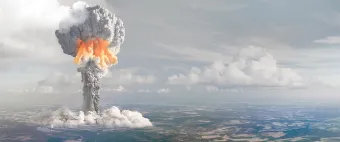Three Ways in which the TPNW Will Change Global Security This Friday

Three Ways in which the TPNW Will Change Global Security This Friday
The United Nations (UN) Treaty on the Prohibition of Nuclear Weapons (TPNW) will enter into force on Friday, 22 January 2021. Controversial from the outset, the treaty has been dismissed by its critics as merely a symbolic gesture, or “emptily divisive virtue signaling”. None of the nine nuclear-armed states has joined the treaty, and neither have any of their nuclear-dependent allies. So what will actually change when the treaty is in force? Three things, all of them important.
1. Nuclear weapons are (finally) illegal under international law
For the first time, nuclear weapons will be categorically illegal under international law – no exceptions, no loopholes – prohibited by a global multilateral treaty negotiated and adopted by the UN General Assembly. The treaty fills the “legal gap” with respect to the prohibition of weapons of mass destruction, outlawing nuclear weapons in the same way that the 1972 Biological Weapons Convention (BWC) and 1993 Chemical Weapons Convention (CWC) outlaw biological and chemical weapons, respectively. Legally, the provisions of these three treaties dealing with weapons of mass destruction apply only to their states parties, and none enjoys universal membership, yet the norms established by the BWC and CWC have global reach, and the TPNW now resides firmly in the same category.
This has wide-ranging ramifications, not least for banking, finance and industry. Banks, pension and investment funds, and other institutional investors will find themselves increasingly obliged to divest from and refrain from dealing with companies involved in the production, maintenance or operation of nuclear weapons – in the same way as they must avoid supporting biological and chemical weapons and terrorism. This may take some time, but as TPNW states parties enact national legislation implementing the prohibitions of the treaty, international financial institutions operating in these countries will be forced to act in accordance with these prohibitions.
2. Implementation of the positive obligations of the TPNW will begin
Article 6 of the treaty obliges states parties to provide assistance to victims of nuclear weapons (including victims of nuclear weapons testing) and to take measures for the environmental remediation of areas contaminated by the testing or use of nuclear weapons. Implementing these obligations will require surveys and needs assessments, consultation with victims and their governments, and awareness-raising and communication programmes and activities.
These processes will focus much-needed global attention on the human and environmental impact of nuclear testing and the risks of nuclear war, among other things raising the profile of the Comprehensive Nuclear-Test-Ban Treaty and highlighting the importance of its International Monitoring System. It will also make the TPNW difficult to ignore for those nuclear-armed states that have tested nuclear weapons in countries that have joined or will join the treaty: for example, the United States in the Marshall Islands, Russia in Kazakhstan and France in Algeria.
3. The dynamics of multilateral disarmament are changing profoundly
The treaty marks a return to disarmament based on true multilateralism and the UN’s founding principles. Fittingly, the TPNW becomes law just as the COVID-19 pandemic has both demonstrated the importance of international collective action to respond to global threats and starkly highlighted the dangers of nationally focused and go-it-alone responses. The TPNW is not an expedient arms control deal between powerful adversaries nor an exclusive non-proliferation cartel of wealthy exporters, but an embodiment of the principle that nuclear weapons are a global threat to which every state – however small – has both the capacity and duty to respond.
Championed, negotiated and brought into force chiefly by countries of the Global South, in the teeth of determined and sometimes vicious opposition by many of the world’s most economically and militarily powerful states, the TPNW shows that global governance is not a spectator sport to be left in the hands of a few dominant players while the rest of the world looks on. Its entry into legal force and unfolding implementation will further embolden smaller states to challenge current notions of international security and find collective solutions that they can actively pursue, based on humanitarian principles and the vision of global security embodied in the UN Charter, without waiting for the permission of a few powerful states.
As the world emerges from the COVID-19 pandemic, and with a new administration in the United States that will perhaps be more sympathetic to the aims of the UN, TPNW states parties are well placed to lead a new wave of multilateralism in international security. And it starts on Friday.
Richard Lennane is an Executive-in-Residence at the GCSP. He was formerly a UN disarmament official and an Australian diplomat.
